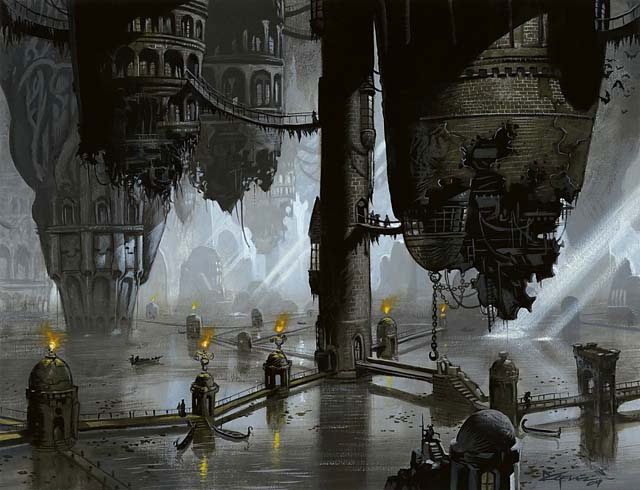I. The End of the Last Age
“In the first days of the dawn era, the world was covered in ice. The passion of the Gods of Light brought warmth to the land, and the ice retreated to the far corners of the world.” – Tales of Creation, Act III
Not much is known about the history of Calbion prior to the last ice age. All that is known is that civilization spread as the ice receded. Some texts record that civilization existed in some limited sense before the end of the last ice age, and a few historians speculate that there may have been a time before the last ice age when societies prospered.
A single source, known as the Chronicles of the Ancients, which was found buried deep within an ancient temple, is said to be the only surviving account of pre-ice history. It claims that the last ice age was caused by the end of a massive war between two vast empires that controlled all of Calbion. The Holy Evangelite Empire, and the Unholy Dhemonhite Empire were locked in a titanic struggle for domination of the world. The ruling class of both empires were the Nephilic, or descendents of Angels and Demons who had fallen in love with the sons and daughters of the races of the material plane.
The script further describes the final battle that purged the world of the Nephilic. It claims that the greatest of the Nephilic either rose into Celestia, such as Sabre, the First Paladin, or were thrown into Hell, such as Malice, the Champion of Evil.
In fact, the script lists almost all of the current Gods of the world. Obviously, the official churches dispute the accuracy of these accounts. In any case, the first Year of the New Dawn, or 1 YND, marks the official point where the great historian Plaedius begins his first account of the history of the world.

II. The Rise of the First Empires
“I bring strength, security, a united front against the forces of evil! Stand with me, and we shall bring forth the greatest state of all possible futures!” – Allik Zenstrumesa, First Emperor of Zhakhustra
The earliest of the Great Empires was Doria. Founded in 3254 YND by the unified Elven Kingdoms, the Dorian Empire originally spanned most of the central continent. At its height Doria held sway over the entire Northland, and was rumoured to have begun the process of colonizing other continents to the south, west, and east.
Doria began as the only Elven kingdom on the continent. This early kingdom, of which its name and history are lost, was eventually broken up into ten warring states, each representing a bloodline that claimed the Elven throne. Eventually one lineage, that of Doriana Mordekeller, succeeding in conquering the other states and reuniting the Elven peoples. Upon her ascension, she decreed herself Empress of Doria.
By 3729 YND, the lands of the kingdoms of Hustrala and Zhakos were feeling the increasing pressures of Orcish expansion from the north. The squabbling Orc clans had united under the banner of the Dark Horde, a potent and surprisingly well organized army that threatened to conquer the human kingdoms. Doria was too busy with its own concerns to help its former vassals, and so things were looking grim when a brilliant young general of Hustrala named Allic Zenstrumesa achieved a series of decisive victories against the overwhelming numbers of the Dark Horde. Hailed as a hero and champion, he quickly convinced the various nations to unite behind his banner.
At the time it seemed like a good idea to hand over more power to the victorious general, after all, what had their incompetent kings given them but defeat and indecisiveness. Unbeknownst to the general populace of Hustrala, the great general was not as he seemed. In fact Zenstrumesa secretly controlled the Dark Horde, which had oh so suddenly become organized and daring. The Dark Horde was by all accounts fearless and brutal, yet they melted before the general’s forces.
As he continued to rack up victory after victory, the celebrating peoples demanded he be made the new king. By popular support, one of the longest existing royal lineages was extinguished as the general declared the king unfit to govern, and dethroned him. By this time he now commanded the entire army, which he greatly expanded as the country was put on a war footing, devoted to the great general’s dream of freeing the world of the Dark Horde. Then, in another twist, he alarmingly discovered that Zhakos had secretly made a pact with the Dark Horde to destroy Hustrala. The people’s anger raged and the general easily justified the invasion of their former ally. Obviously, it was the corrupt king, and not the people’s fault, so Zenstrumesa had the royal family of Zhakos executed for treason and united the two countries to form the great Zhakhustra.
The people cheered as the general proclaimed himself Lord Emperor and quietly began purging his newfound empire of dissenters, all the while fighting a war he had constructed. The Dark Horde eventually disintegrated as its leaders were killed during a attempt at diplomacy with the Lord Emperor, ostensibly revenge for all the diplomats slain by the Dark Horde, in reality, all staged. By then, the empire had begun to expand further, as it captured former Dark Horde territory, kingdoms such as Obsidos, Kelmoria, and Perthcart, refusing to return control to the previous governments, but rather placing them under the protection of the Empire.
Markus Athaerius was said to have been the greatest paladin in history. It is said he spent many years adventuring throughout Northland, fighting evil wherever it spread, and righting wrongs. He made many allies, and word spread of his charm, his wisdom beyond years, and his skill with the sword. On one particular occasion, Markus traveled to the land of Zhakhustra, and achieved incredible fame after he fought Lord Zenstrumesa atop the First Monolith. It is said one could hear the clashing of swords from miles away.
It was during the early years of the rise of Zhakhustra, when the first unholy emperor was still able to fool people into believing he was trying to create a “just empire”, though his increasingly harsh measures and decrees were beginning to create suspicions. Having seen through the Emperor’s façade, Markus single-handedly united the people of the Seven Thaolian Kingdoms into an unified front to challenge the rising power of Zhakhustra. Eventually, the Thaolian Alliance would form the core of the Holy Athaerian Empire.
Markus never lived to see that empire formed. Indeed it is questionable that he ever intended to have an empire built in his own name. He was ultimately declared first emperor of Athaeria posthumously, after having suffered a fatal wound at the Battle of Correll. His eldest daughter, Diania Athaerius was crowned empress and set the tone of the Athaerian rule by granting the former sovereigns of the Seven Thaolian Kingdoms each the rank of Archduke, and allowing them to continue to govern their former kingdoms as provinces of the greater empire.

III. The Fall of the Dorian Empire
“The Dorian Empire shall rule for another ten thousand years!” – Dardrak Mordekeller, Last Emperor of Doria
By the 13th Dynasty, cracks in the power of Doria were already beginning to form. With Zhakhustra abandoning all pretenses and formally embracing Hextor, and the united Athaeria launching the first of the Northern Crusades, the Dorian Empire’s hold on the continent had already shrunk to a third of what it was. When Imperial Praetor Markken Grandus the Supreme united the Itorian City States and was proclaimed First Consul of the Grand Republic of Itoria, the Dorian Empire could only watch as its isolated southern colonies fell.
As an apparent response the increasing external pressures, the Dorians began to look upwards and constructed floating isles, building vast cities in the skies. The magic used to maintain these isles is not the same as that of modern airships, but rather is reliant on levitation spells made permanent on crystals, stones and soil that make up the bulk of the “ground” of these isles. Unfortunately, the effects of dispelling the magic that keeps them afloat… lets just say the fall of the Dorian Empire was quite literal. Even today, the floating isle magic is used rarely, and mostly on dispel magic resistant military fortresses.
Markken Grandus is credited with founding what would eventually be called Granditore, but Grandus was in fact a title given to him in his latter years of rule. His original surname is believed to have been stricken from all records after he took the title. It is rather unfortunate that, though he united the people of Itoria and built what would become a lasting empire through sheer force of personality and charisma, his lineage did not continue.
After his untimely death, his greatest general, Arctorus Septum challenged Grandus’ son to a duel for right of succession. Though Septum was more than twice the age of Derrel Grandus, the old general managed to wound the young prince with seemingly impossible speed and swiftness. Afterward, some contended that the general had used haste magic and therefore cheated, which quickly became the Grandus camp’s main objection. In the ensuing struggle for power, the entire bloodline of Grandus was officially wiped out. Though pretenders to the throne have claimed in the past to be the sole surviving heir, none have proven their claims.
IV. The Elven Diaspora
“The children of the forest shall scatter as leaves from a dying tree.” – from the Second Prophesy of Xenos
With the collapse of the Dorian Empire, the Elven Crown was broken, and elves scattered as the proverbial wind before an onslaught of infighting factions, barbarian hordes, and opportunistic foreign invasions.
Over a period of decades, the refugees settled in various places ranging from modern day Vespice to Khoronos. Though never more than a minority among the populace of these nations, they brought with them centuries of culture and knowledge.
It is not an exaggeration to say that the Diaspora brought the very knowledge of magic to the lands outside of the Dorian Empire, which had previous held a tight monopoly on the teaching and use of magic. Indeed, the Mages Guild evolved from the long forgotten Ministry of Arcana in the old Empire.
V. The Dwarven Reunification
“Dwarves are like rocks. Hard to break, harder to put back together.” – Ancient Proverb
Having spent countless centuries living under the boot of the Elven Crown’s class hierarchy, the dwarves were the first to embrace the weakening of the Dorian Empire, and shed few tears when it ultimately fell.
The Dorian Empire’s use of magic had given it easy victories of the then superstitious dwarves who feared the bewitchery of the elves. It didn’t help that most of the dwarves on the surface were little more than refugees escaping a lengthy underground war between the Dwarven United Kingdom, and the Golbi Empire, which consisted of Goblins and Kobolds.
With the fall of the Dorian Empire, the seals to the underworld were destroyed and the now sizable population of surface dwarves were able to reunite with their brethren. Centuries of life in the sun however had made many of the surface dwarves maladjusted to the subterranean lands and many ultimately chose to stay rather than return to the Dwarven United Kingdoms.
Another side effect of the breaking of the seals to the underworld was a resurgence of Goblin activity on the surface, though it is believed by this time that Kobolds were all but extinct.
VI. The Eternal War
“Death before honour!” – Obsidian Legion War Cry
Three centuries since Markus Athaerius and Allik Zenstrumesa dueled to the destruction of the First Monolith, their empires continued to grow, and continued to spar with each other. Not even the greatest diplomats of the age could ever convince the two sides to anything more than a temporary cease fire, which would almost never last as long as originally signed.
Inevitably such wars were draining to both sides, and it became fairly apparent that other nations were taking advantage of this. Eventually it was decided that some sort of truce had to be signed to prevent the rising powers of Granditore and others from overtaking the two empires.
VII. The Treaty of Pax Imperium
“The ink was not even dry before the first pact was broken.” – Chronicles of Magnus
As the three empires settled into a sort of uneasy stalemate, it became apparent that some sort of treaty would have to be worked out.
It took almost six years, but the negotiations, which were often interrupted by assassination attempts and sabotage, eventually concluded with the signing of one of the most famous documents in history.
The Pax Imperium was, to be blunt, a compromise that no one particularly enjoyed. It essentially set rules of engagement that limited the scope of warfare to exclude attacks against trade and civilians. It proposed a system of limited warfare that would settle territorial disputes without drawing the entire nation into the conflict.
Though met with great fanfare, it was almost immediately disregarded as impossible to police, and unlikely to last.
Surprisingly, it was Granditore who would step up and enforce the agreement. With it’s fanatically devotion to the very word of law, Granditore declared itself the protector of the Pax and used its ever increasing military might to enforce the letter of the law.
Interestingly, this has resulted in a situation where Granditore tends to support the weaker side of the conflict between Athaeria and Zhakhustra, creating an even more arduous deadlock.
Thus, though never really followed in its entirety, the Pax Imperium has made a significant impact on the nature of war in Calbion, with any war almost always being argued justified by the treaty, whether true or not.

VIII. The Lavender Crusades
“Please don’t die, I haven’t even… no… this can’t be, it’s not fair! Why… why does everyone, everyone I love… why Solace? Why do they have to die?! No more… please, no… more…” – The Last Tears of St. Aylia
It all started with an assassination. Bishop Johan Sophilos of the Church of Lavender was killed on the 11th Moon of 4876 YND. His adopted daughter, a shy young girl named Aylia Sophilos barely escaped with a group of adventurers as the city of Camrin of the neutral country of Habstrom was razed by the Obsidian Legion. Aylia was no ordinary girl however, for the blood of angels pulsed through her fragile human veins.
The young knight’s squire, Kendel Picardy, led the band of adventurers, who vowed to find Aylia’s father’s killers, though the girl didn’t want further bloodshed, she saw much of it, as the first Lavender Crusade was declared by Athaeria, Alanista, and Khoronos, against Zhakhustra and its vassals, and Granditore entered the war to protect its interests on the side of the Zhakhustrans. Soon, the followers of Xeno’s would also join the battle, attacking both sides, and razing land and peoples in the name of sanctification.
Perhaps it was as Kendel died in her hands, or perhaps her divine heritage was repulsed by the undead as they attempted to consume her, but something happened in the fields of lavender in Habstrom on the 17th of 7th Moon of 4880 YND. The Awakening of St. Aylia is to this day, not entirely understood.
IX. The Interim
“The last hundred years have got to be the most boring in recent memory.” – Bad Elven Joke
The last few decades have been a period of relative stability and quiet, though wars and battles are still fought, and events do occasionally bring crisis and opportunity. Nevertheless, borders haven’t moved considerably in a while, and economic prosperity has kept most nations content.
X. The Wake
“In the wake of legions, war shall call forth madness. Only those chosen by the angels shall resist the onslaught, and for a time the lords of darkness shall spread.” – from the Ninth Prophesy of Xenos
Nothing is known of what the prophet Xenos called The Wake, other than that it is expected to occur sometime soon. Some scholars have interpreted the tenth prophesy to speak of a time when demons and devils will return to wreck havoc upon the world, if they haven’t already arrived. Others consider it a metaphor for a war between two alliances that will cause greater upheaval than ever seen before.